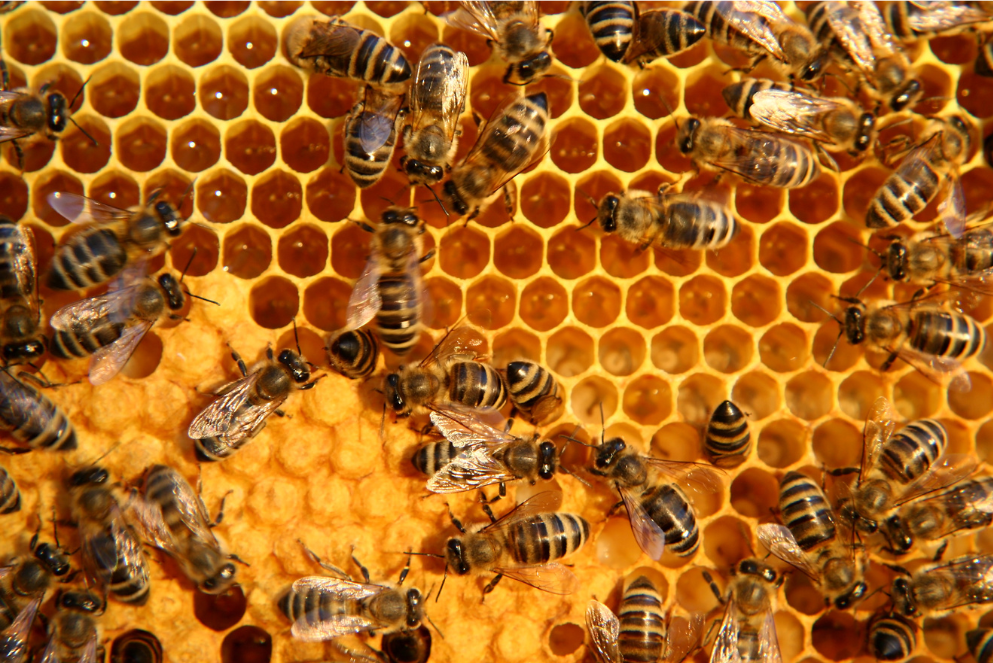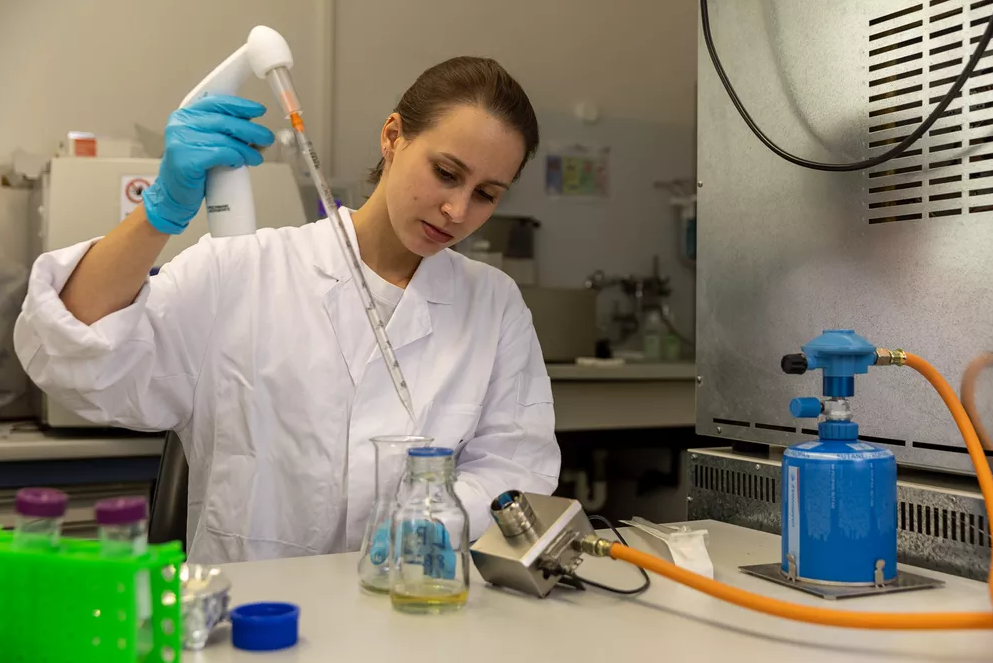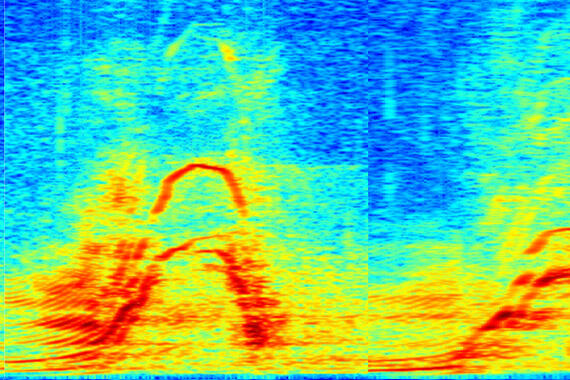Institute of Cell Biology & Neuroscience

Research
At present, seven of the Institute's departments are investigating neurobiological and cell biological problem complexes on animals as well as on animal and human cells. One department with a bioinformatic focus belongs to the Institute, as does the Institute of Apiology (Oberursel), which is jointly supported by the Polytechnical Society and the Faculty of Biological Sciences; two departments are members of the Excellence Cluster Macromolecular Complexes of the 51ÁÔĆć.
The research spectrum ranges from cellular genetics and molecular neuronal mechanisms to physiology and pharmacology up to behavioural investigations in humans and animals. For example, processes of cellular communication and disturbances such as those occurring in tumour growth are at the research focus. An additional focus is synaptic processes, the neogenesis of synapses and the role of extracellular nucleotides for neuronal information processing.
Learning process and their pharmacological bases are investigated, e.g., on simple insect models. Investigations on the transformation of sensorial stimuli into neuronal potential changes are also part of this research. Bioacustical, neurophysiological and cognitive mechanisms of sensory processing are analyses just as are pathological forms of processing, for example, tinnitus
Teaching
The Institute's work groups participate in the Bachelor's Study Programme in Biological Sciences, the teacher training courses of study as well as in the Bachelor's and Master's Degree Programmes in Bioinformatics. Beyond this, the institute organises the Master's Programme in Interdisciplinary Neuroscience as well as the one in Cell Biology and Physiology.
Methods
The Institute's staff performs experimental investigations on different organisms and cell cultural models. Genetically modified mice are also employed. The development of scientific methods is another focus. Thus, for example, the newest techniques of optical biophysics and microscopy are designed; they are and will be of great importance for the investigation of cellular and developmental process.
Co-operations
The Institute maintains extensive international co-operations as well as an institute's partnership with the Cuban University of Havana. The SciMento is organised by the institute; this is a state-wide mentoring programme for women PhD students and young women postdocs.
.
Working groups at the Institute of Cell Biology and Neuroscience
Teaching at the Institute of Cell Biology and Neuroscience
Master Programs
Other courses of study in which the institute is involved
Dr. James Cleland
DKFZ and EMBL
"Mechanisms of sexual dimorphism in liver physiology"
Inviting person: Prof. Dr. Virginie Lecaudey
We also recommend the colloquia of the Institutes for "Ecology, Evolution and Diversity" and "Molecular Biosciences" as well as the lectures offered by the Senckenberg Biodiversity and Climate Research Center (BiK-F).
>
>

July 2024 - Stelzer lab
In
September, Ryan Sarkar of the team of Dr. Francesco Pampaloni (AK Stelzer) will
be taking part in a 4-week long analogue mission at LunAres Research Station in
Poland to simulate a crewed space mission. Analogue missions are important in
preparing astronauts, operations, and hardware for space using relevant
environments. The September campaign will be run by LunAres in collaboration
with the University of Zurich and will focus on human factors, psychology, and
medicine. The mission will allow Ryan to test hardware for the second
experiment by the team to fly to the International Space Station as part of a
campaign by Dr. Pampaloni and the European Space Agency. The LunAres facility
is located in Poland and allows analogue astronauts to operate in simulated
extra-terrestrial settings including even planetary extra-vehicular activities
(EVA).

2024, February - Kössl lab
FAZ-article from Feb 27, 2024:
Uni Report article from Feb 22, 2024:
Reference is made to the research of AK Kössl, citing the publication:

2024, February - Hefendehl lab:
The MICRO-BLEEDs consortium, convened at 51ÁÔĆć on February 22-23, comprises a distinguished panel of experts in the field of cerebral small-vessel diseases and brain cell function.
The consortium includes (left to right) Prof. Ravi Rungta from University Montreal, Prof. Michela Matteoli from Humanitas University Milan, Prof. Gabor Petzold from DZNE Bonn, Prof. Pablo Blinder from Tel Aviv University (not in photo) and Prof. Jasmin Hefendehl (speaker of the consortium, 51ÁÔĆć).
Led by an interdisciplinary team of clinicians and researchers, MICRO-BLEEDs aims to shed light on the molecular pathways contributing to CMB-induced brain damage. Of particular interest are the brain's resident immune cells, microglia, and the microglial gene TREM2, known to play a pivotal role in brain health. By leveraging advanced technologies and mouse models of CMBs, the consortium seeks to elucidate how TREM2 activation influences microglial function, blood vessel dynamics, synaptic activity, and overall brain health.
Moreover, MICRO-BLEEDs endeavors to explore the therapeutic potential of TREM2-targeted antibodies in ameliorating CMB-induced damage. By identifying novel targets for CMB prevention and treatment, the consortium aims to pave the way for future clinical trials, ultimately striving to improve outcomes for individuals affected by CMBs.

2024, February - Lecaudey lab:

Research
At present, seven of the Institute's departments are investigating neurobiological and cell biological problem complexes on animals as well as on animal and human cells. One department with a bioinformatic focus belongs to the Institute, as does the Institute of Apiology (Oberursel), which is jointly supported by the Polytechnical Society and the Faculty of Biological Sciences; two departments are members of the Excellence Cluster Macromolecular Complexes of the 51ÁÔĆć.
The research spectrum ranges from cellular genetics and molecular neuronal mechanisms to physiology and pharmacology up to behavioural investigations in humans and animals. For example, processes of cellular communication and disturbances such as those occurring in tumour growth are at the research focus. An additional focus is synaptic processes, the neogenesis of synapses and the role of extracellular nucleotides for neuronal information processing.
Learning process and their pharmacological bases are investigated, e.g., on simple insect models. Investigations on the transformation of sensorial stimuli into neuronal potential changes are also part of this research. Bioacustical, neurophysiological and cognitive mechanisms of sensory processing are analyses just as are pathological forms of processing, for example, tinnitus
Teaching
The Institute's work groups participate in the Bachelor's Study Programme in Biological Sciences, the teacher training courses of study as well as in the Bachelor's and Master's Degree Programmes in Bioinformatics. Beyond this, the institute organises the Master's Programme in Interdisciplinary Neuroscience as well as the one in Cell Biology and Physiology.
Methods
The Institute's staff performs experimental investigations on different organisms and cell cultural models. Genetically modified mice are also employed. The development of scientific methods is another focus. Thus, for example, the newest techniques of optical biophysics and microscopy are designed; they are and will be of great importance for the investigation of cellular and developmental process.
Co-operations
The Institute maintains extensive international co-operations as well as an institute's partnership with the Cuban University of Havana. The SciMento is organised by the institute; this is a state-wide mentoring programme for women PhD students and young women postdocs.
.
Working groups at the Institute of Cell Biology and Neuroscience
Teaching at the Institute of Cell Biology and Neuroscience
Master Programs
Other courses of study in which the institute is involved
Dr. James Cleland
DKFZ and EMBL
"Mechanisms of sexual dimorphism in liver physiology"
Inviting person: Prof. Dr. Virginie Lecaudey
We also recommend the colloquia of the Institutes for "Ecology, Evolution and Diversity" and "Molecular Biosciences" as well as the lectures offered by the Senckenberg Biodiversity and Climate Research Center (BiK-F).
>
>

July 2024 - Stelzer lab
In
September, Ryan Sarkar of the team of Dr. Francesco Pampaloni (AK Stelzer) will
be taking part in a 4-week long analogue mission at LunAres Research Station in
Poland to simulate a crewed space mission. Analogue missions are important in
preparing astronauts, operations, and hardware for space using relevant
environments. The September campaign will be run by LunAres in collaboration
with the University of Zurich and will focus on human factors, psychology, and
medicine. The mission will allow Ryan to test hardware for the second
experiment by the team to fly to the International Space Station as part of a
campaign by Dr. Pampaloni and the European Space Agency. The LunAres facility
is located in Poland and allows analogue astronauts to operate in simulated
extra-terrestrial settings including even planetary extra-vehicular activities
(EVA).

2024, February - Kössl lab
FAZ-article from Feb 27, 2024:
Uni Report article from Feb 22, 2024:
Reference is made to the research of AK Kössl, citing the publication:

2024, February - Hefendehl lab:
The MICRO-BLEEDs consortium, convened at 51ÁÔĆć on February 22-23, comprises a distinguished panel of experts in the field of cerebral small-vessel diseases and brain cell function.
The consortium includes (left to right) Prof. Ravi Rungta from University Montreal, Prof. Michela Matteoli from Humanitas University Milan, Prof. Gabor Petzold from DZNE Bonn, Prof. Pablo Blinder from Tel Aviv University (not in photo) and Prof. Jasmin Hefendehl (speaker of the consortium, 51ÁÔĆć).
Led by an interdisciplinary team of clinicians and researchers, MICRO-BLEEDs aims to shed light on the molecular pathways contributing to CMB-induced brain damage. Of particular interest are the brain's resident immune cells, microglia, and the microglial gene TREM2, known to play a pivotal role in brain health. By leveraging advanced technologies and mouse models of CMBs, the consortium seeks to elucidate how TREM2 activation influences microglial function, blood vessel dynamics, synaptic activity, and overall brain health.
Moreover, MICRO-BLEEDs endeavors to explore the therapeutic potential of TREM2-targeted antibodies in ameliorating CMB-induced damage. By identifying novel targets for CMB prevention and treatment, the consortium aims to pave the way for future clinical trials, ultimately striving to improve outcomes for individuals affected by CMBs.

2024, February - Lecaudey lab:



